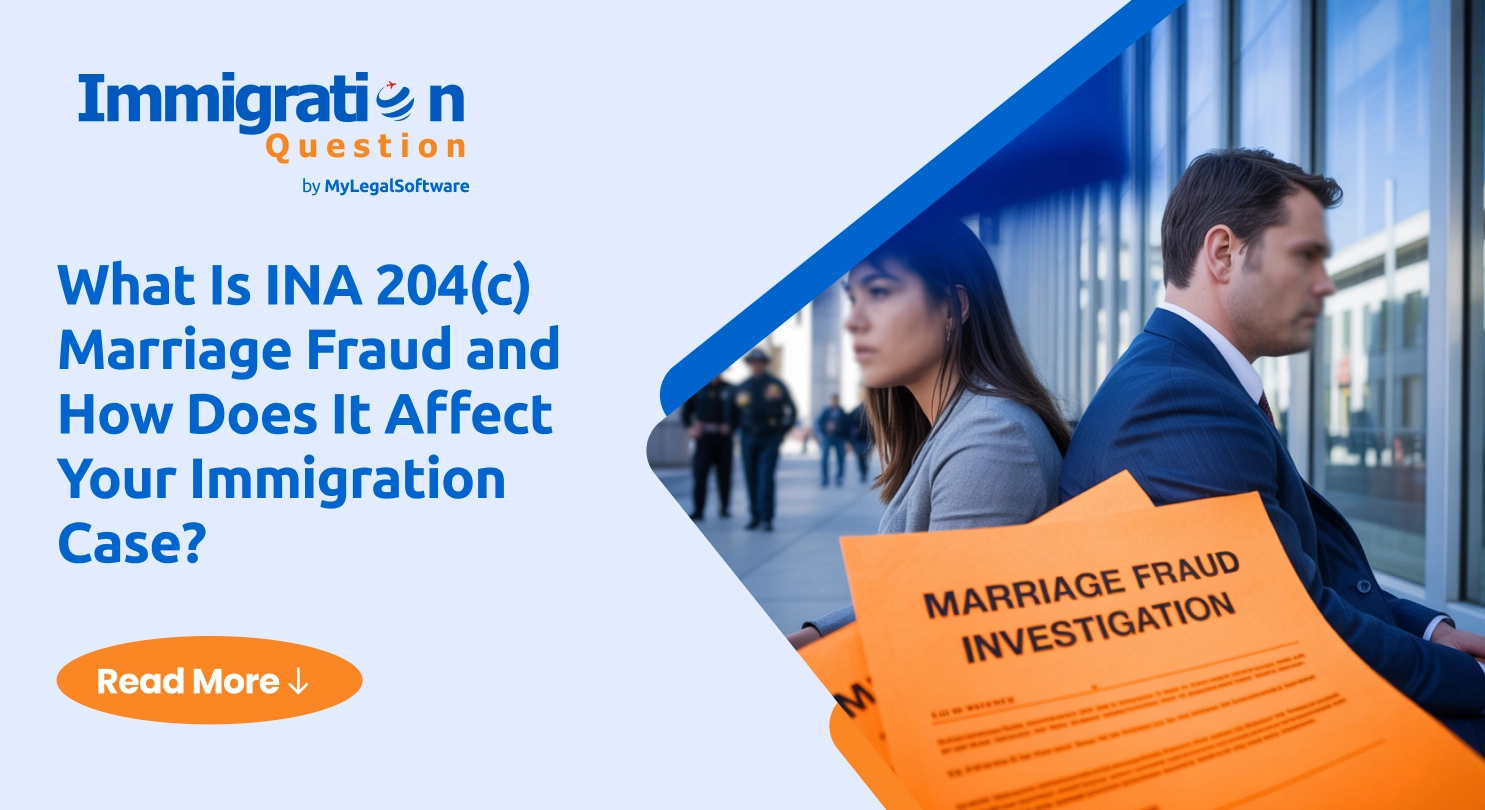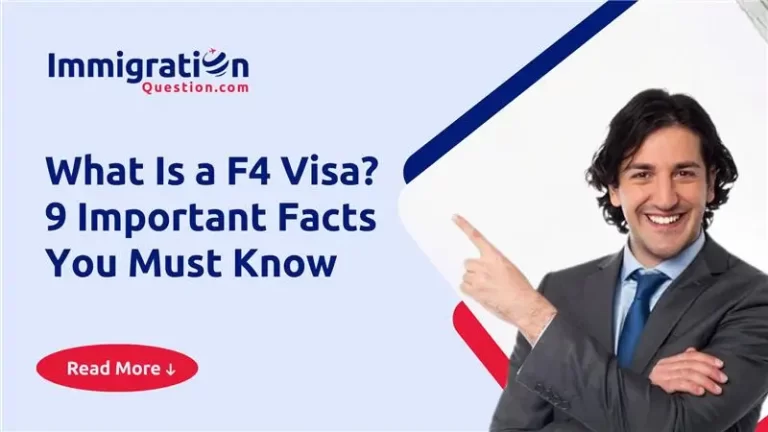When it comes to U.S. immigration, marriage is often seen as a pathway to lawful permanent residency. But if the government believes a marriage was entered into solely to gain immigration benefits, things can take a serious turn. That’s where INA 204(c) comes in – a law that can permanently ban someone from getting a green card.
In this blog, we’ll walk you through what 204(c) means, how it applies to fraudulent marriage immigration cases, and what the real-life consequences can look like. If you’re concerned about a sham marriage immigration situation, or you’re navigating accusations of fraud marriage USCIS violations, keep reading.
What is INA 204(c) and Why Does It Matter?
INA 204(c) refers to a section of the Immigration and Nationality Act that permanently bars any immigrant from receiving future immigration benefits if they’ve attempted or committed marriage fraud immigration – even if they’re not convicted of a crime.
This rule matters because USCIS doesn’t need a court conviction to invoke it. If they find enough evidence that someone entered into or tried to enter into a sham marriage for green card purposes, the agency can deny future petitions.
It’s important to note that 204(c) immigration cases are not the same as criminal prosecution. You won’t necessarily go to jail, but you could face a lifetime ban on immigration benefits. That’s why anyone dealing with 204c USCIS questions should take the issue seriously.
Need immigration answers fast? Immigration Question connects you with experienced immigration attorneys—within hours. Get reliable advice, and many attorneys offer free consultations to help you take the right next step with confidence.
What Constitutes Fraudulent Marriage Immigration Under 204(c)?
A fraudulent marriage is one where the couple enters into the relationship solely for immigration benefits. There’s no intent to build a real life together. This is different from a troubled but genuine marriage. Even if a couple eventually separates or divorces, that doesn’t automatically mean the marriage was fraudulent.
Examples of sham marriage immigration might include:
- Paying someone to marry you for a green card
- Faking documents like lease agreements, joint bank accounts, or photos
- Being married in name only while living completely separate lives
USCIS may look for red flags like inconsistent answers during interviews, lack of shared assets, or statements from others that suggest the marriage isn’t real. All of this can trigger a fraud marriage USCIS investigation.
What Happens When You Are Found to Have Committed Marriage Fraud Under 204(c)?
If USCIS finds you guilty of marriage fraud immigration under 204(c), the consequences are long-lasting:
- You’ll be permanently barred from receiving future immigration benefits, even through other pathways.
- Any pending petitions or applications will be denied.
- The ruling applies to both the petitioner and beneficiary in many cases.
In other words, if you’re hit with a 204c immigration finding, you can’t just apply again later or try a different visa.
There’s a distinction between 204(c) violations and other immigration issues. While some infractions may be forgiven with time or waivers, a 204(c) finding is not usually something that can be undone easily.
How to Report a Sham Marriage to Immigration Authorities?
If you suspect a sham marriage for green card purposes, it’s possible to report it. Here’s how to report it to immigration:
- Contacting USCIS through their fraud tip line or online form
- Providing detailed information, such as names, dates, and documentation
- Submitting reports via local ICE offices or the INS report fake marriage procedures (now handled by USCIS/ICE)
You can report a fake marriage anonymously, and you are protected from retaliation. USCIS takes all reporting fake marriage tips seriously.
What Happens When You Report a Fake Marriage to USCIS?
Once a report is submitted, USCIS will start an investigation. The process includes:
- Reviewing the couple’s immigration file
- Conducting interviews and home visits
- Requesting additional evidence
If the evidence supports the claim, USCIS may issue a Notice of Intent to Deny (NOID) or even refer the case for prosecution. The consequences of marriage fraud immigration can include 204(c) bars, removal proceedings, and even marriage fraud jail time in criminal cases.
That said, false accusations are also taken seriously. If you’re concerned someone might falsely accuse you, it’s crucial to keep strong documentation and possibly consult an attorney.
How Can You Legally Exit a Sham Marriage Without Facing Penalty?
Sometimes, people find themselves in a fraudulent marriage they didn’t fully understand – or were coerced into. If that’s you, there may be ways to exit safely.
First, speak with an experienced immigration attorney. You might qualify for:
- A self-petition under the Violence Against Women Act (VAWA)
- Protection if you were a victim of coercion or abuse
- Legal relief from deportation if you acted in good faith
To avoid harsh fraudulent marriage penalties, gather evidence of your intent, cooperation, and any abuse. Act early and document everything.
Can You Appeal or Waive a 204(c) Finding?
Appealing a 204(c) finding is extremely difficult. USCIS decisions based on 204c violations are discretionary and often final. There are limited options for a challenge:
- File a motion to reopen or reconsider
- Submit new evidence to refute the finding
- Get a strong legal representation
That’s why preventing a 204 c INA issue in the first place is the best path forward.
Final Thoughts
A 204(c) ruling isn’t just a small bump in the road – it’s a dead end in many cases. The consequences of sham marriage immigration are long-term, and understanding its seriousness will help you to protect yourself.
If you’re dealing with marriage fraud, immigration accusations, or worried about how to prove your marriage is real, don’t go through it alone. Get professional legal help.
Visit Immigration Question to connect with licensed immigration attorneys who can answer your questions within hours. With easy scheduling, full privacy protection, and no obligation to hire, Immigration Question makes it simple to get trusted answers.
Frequently Asked Questions
1. Can a 204(c) finding be overturned or appealed?
In most cases, no. Once USCIS makes a 204(c) determination, it’s permanent. However, if you can prove the decision was made in error, you may be able to challenge it with strong legal help.
2. Can someone be deported for a sham marriage even if they’re now divorced?
Yes. Divorce doesn’t erase the original fraud. If USCIS believes the marriage was fraudulent from the start, divorce doesn’t protect you from fraud marriage deportation.
3. Does 204(c) affect only the person who committed fraud or both spouses?
Typically, it affects the beneficiary, but the petitioner may also face consequences, especially if they knowingly participated in the fraud.
4. Can someone report a fake marriage anonymously?
Yes. You can report sham marriage cases anonymously through USCIS or ICE. Just provide as much accurate detail as possible.
5. Can you still get a green card through other means if you have a 204(c) finding?
No. 204(c) findings generally block all future green card paths. It’s one of the most severe penalties in immigration law.











